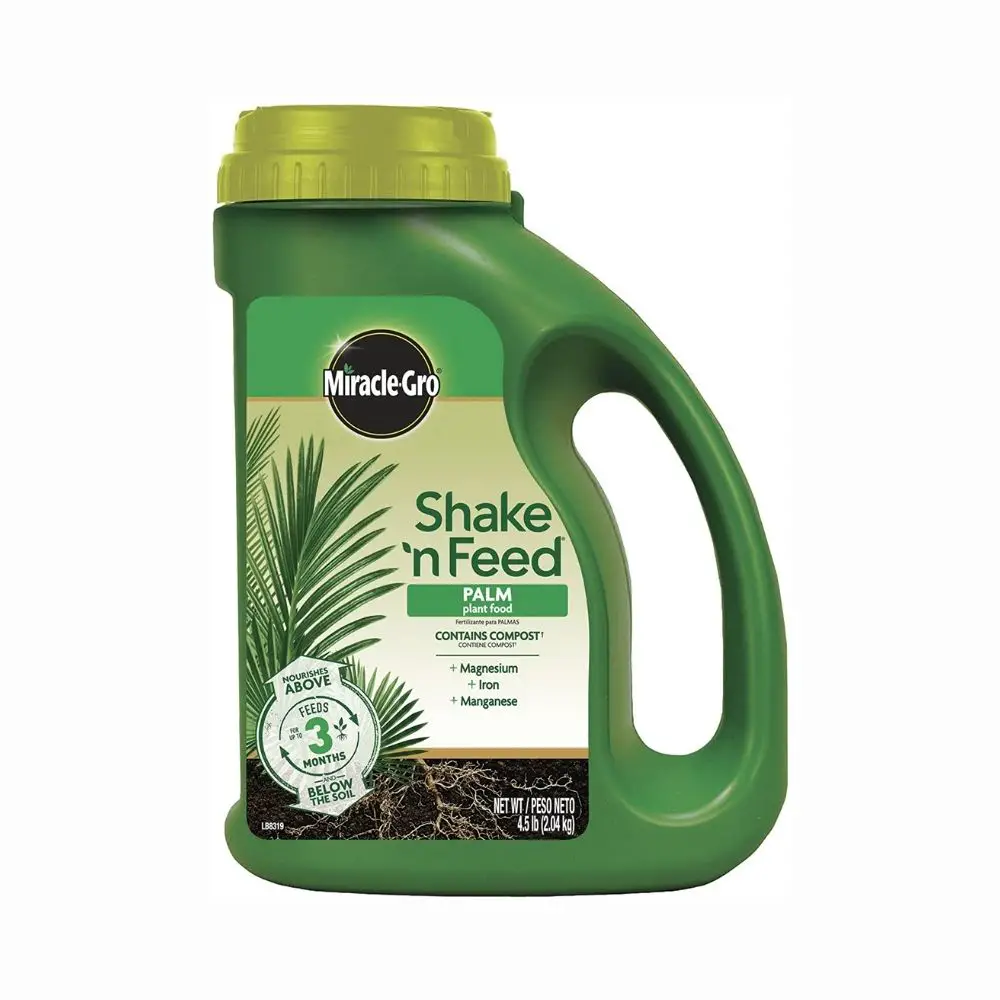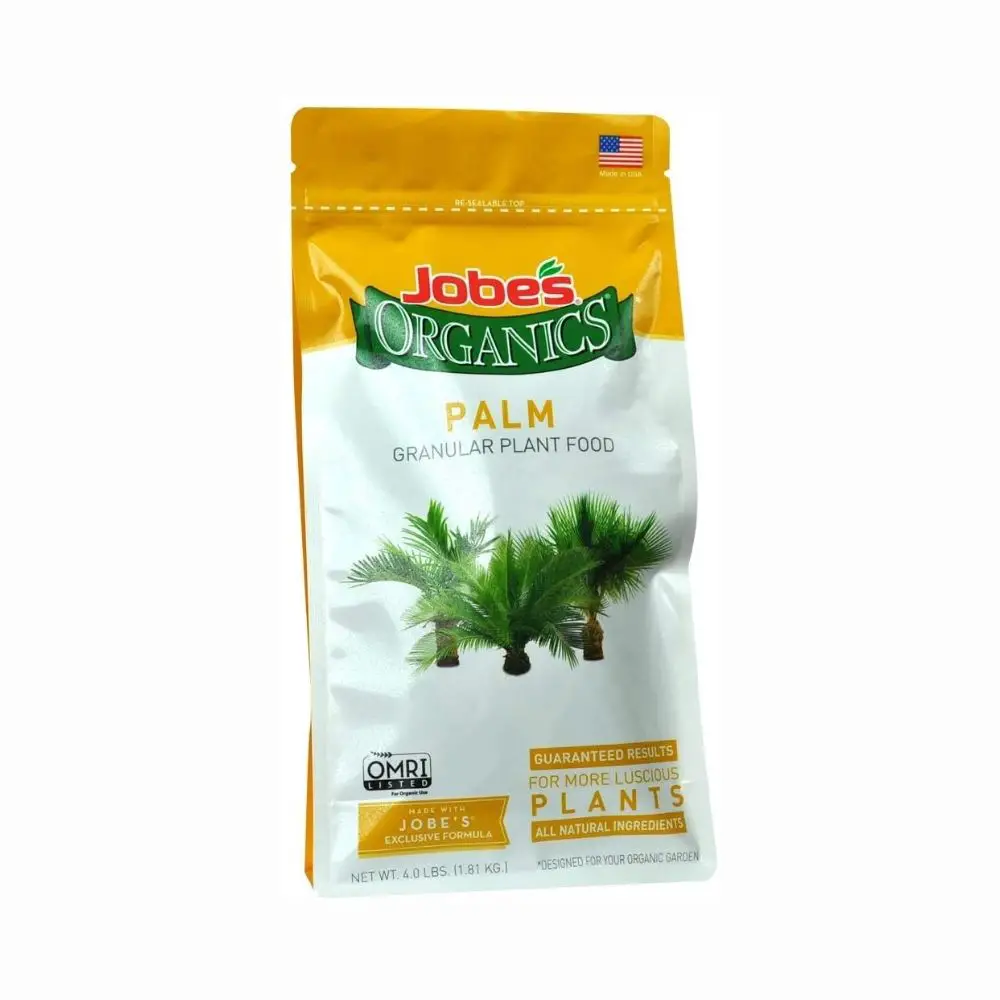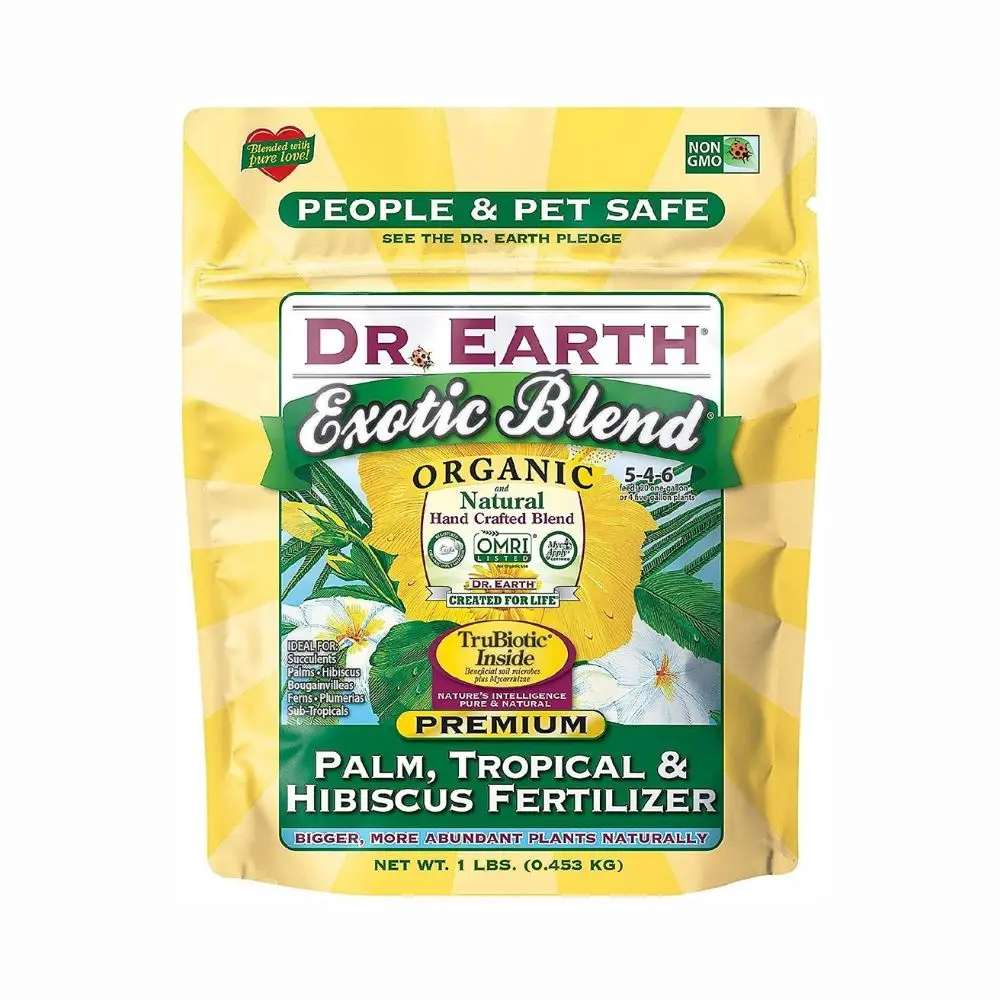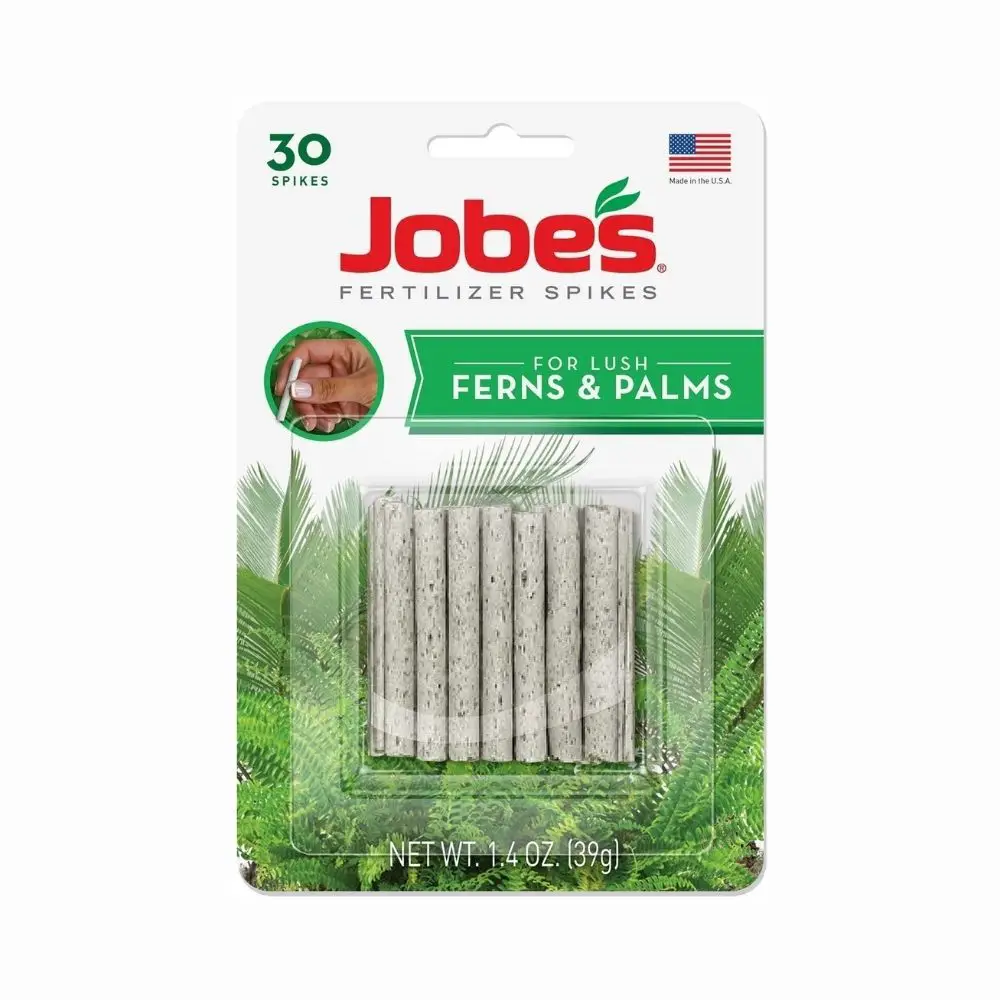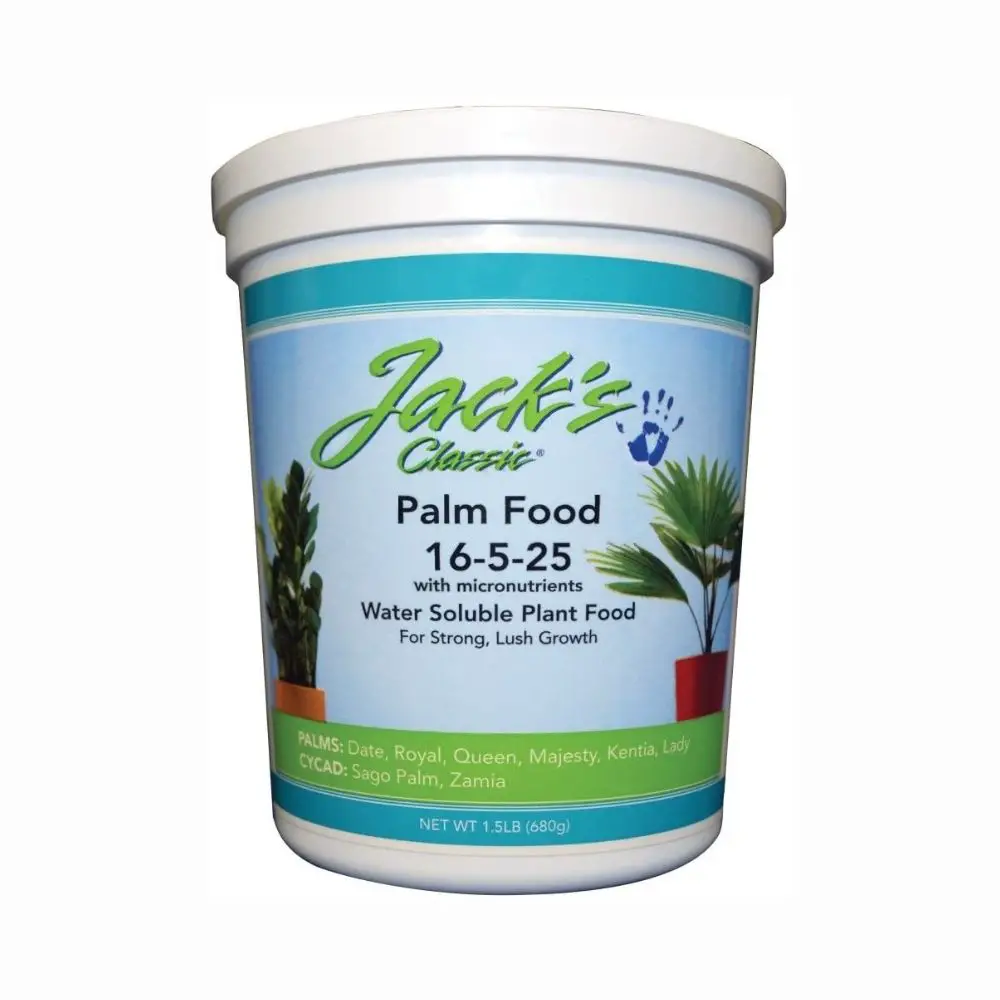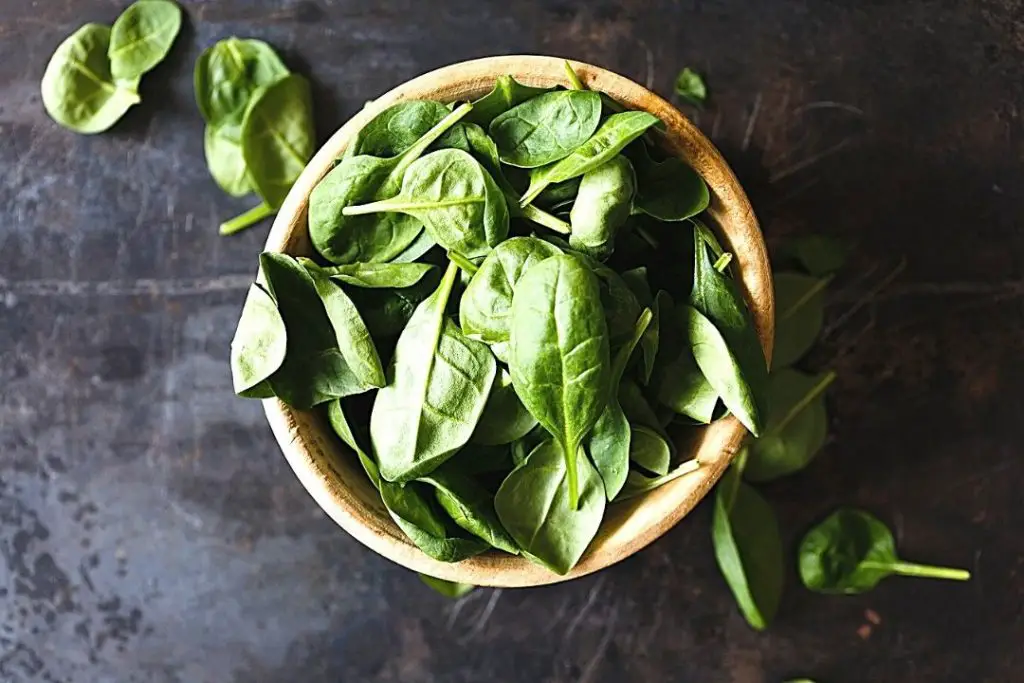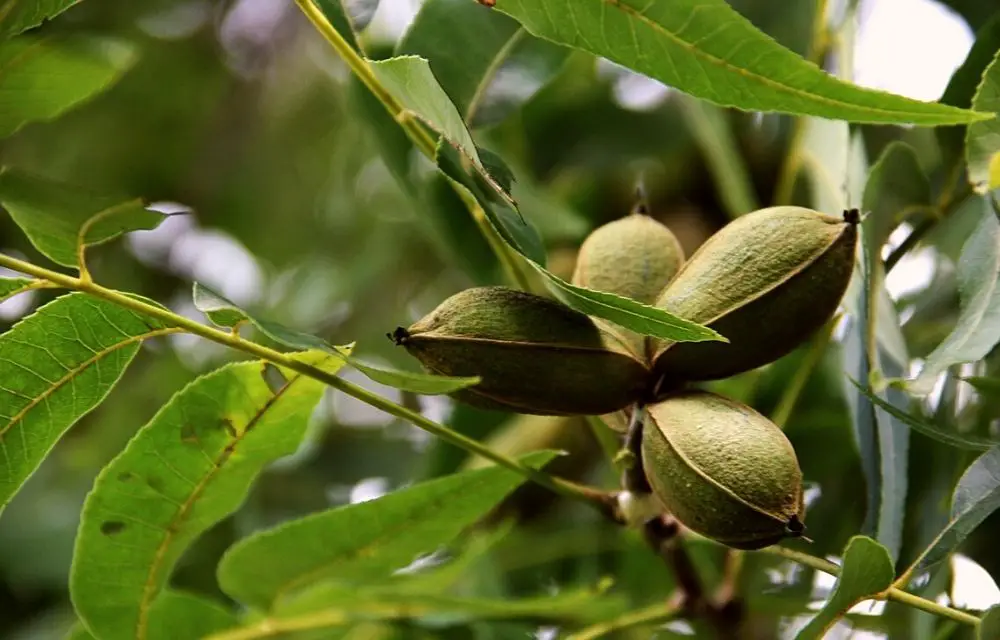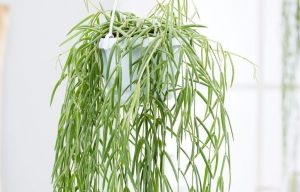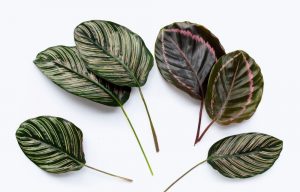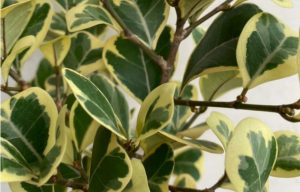Growing beautiful palm trees is easy when you know the perfect palm fertilizer to use. Palms are beautiful plants to grow with their gorgeous big green leaves that create a vacation-type vibe wherever they grow.
My gardening mentor always emphasized fertilizing the plants you are growing. Initially, I never took much concern for fertilizer because I found that my plant grew very well without them. However, it was only, later on, did I realize the immense difference fertilizer makes for your plants.
Using the right palm fertilizer for a specific plant not only allows the plant to grow much faster but the plant will grow in abundance and look a hundred times fresher and beautiful. This is because the plant is getting all the nutrients it needs.
Perhaps because of their association with tropical environments, palms elicit feelings of peace, relaxation, and serenity which adds a positive vibe to the environment it grows in. Palm plants also add a bold, tropical look to home interiors that is surprisingly easy to achieve.
Most indoor palms survive in the same conditions that we find comfortable: warm temperatures, average humidity, and moderate light. Choosing the best plant food for palm trees will allow your palms to grow to their highest potential.
In this article we will look at the 5 best palm fertilizers to use, the types of nutrients palm plants need, the best method of fertilizing your palms, and some frequently asked questions on fertilizing your palm trees.

Best Palm Fertilizer
Miracle-Gro 3002910 Shake ‘N Feed Continuous Release Palm Plant Food
This product is first on the list because of its wonderful perks:
- Contains magnesium, iron and manganese to grow lush palms, cyads and tropical plants
- Prevents yellowing and curling of fronds
- Feeds up to 3 months
- Guaranteed not to burn when used as directed
- No more guessing when feeding your plants
Additionally, you can use this product anywhere. You can directly use it on the ground or in containers.
Miracle-Gro Shake ‘n Feed Palm Plant Food contains compost to feed microbes in the soil. Microbes break down compost into nutrients that support root development which increases water efficiency and grows strong plants.
It contains magnesium, iron and manganese to grow lush palms, cycads and tropical plants and to help prevent fronds from yellowing and curling.
For a beautiful garden all season long, reapply every 3 months and water regularly.
Jobe’s Organics 09126 Palm Tree Granular Plant Food
Jobe’s Organics Palm Granular Fertilizer with Biozome allows you to grow stronger and healthier plants, Jobe’s Organics Palm Plant Food with Biozome is specially formulated to help palm trees and plants increase root mass and foliage.
Jobe’s Organics with Biozome works to improve the soil environment for your plant, preventing the depletion of valuable nutrients, increasing the uptake of nutrients, and reducing the risk of disease, insects, and drought. Great for all indoor and outdoor palm plants, with large compound evergreen leaves known as fronds arranged at the top of an unbranched stem.
Jobe’s Organics Granular Palm Fertilizer is ideal for palms such as coconut palms and fan palms.
Jobe’s Organics Palm Fertilizer with Biozome will deliver long term benefits without synthetic chemicals, creating a healthy ecosystem for your organic garden, your family and the environment.
If you are wondering what exactly is Jobe’s Biozome?
Jobe’s Biozome is a combination of healthy bacteria, Mycorrhizal fungi and Archaea. This unique and proprietary blend of beneficial microorganisms improves the long-term soil quality of your garden, increases root mass, promoting plant growth and helping your garden resist disease, insects, drought and other unfavorable conditions within a growing season.
Some Advantages of Using Jobe’s Organics with Biozome:
- Organic Fertilizer
- No Synthetic Chemicals
- Promotes Root Growth
- Improves Nutrient Absorption
- Improves Soil Quality
- Helps Palm Plants Resist Disease
- Safe for the Environment
- Safe for Use Around Kids & Pets
Jobe’s organic fertilizers are renewable, biodegradable, sustainable, and good for the environment.
Dr. Earth Organic & Natural MINI Exotic Blend Palm
Dr. Earth is the only Non-GMO Project Verified fertilizer in the U.S.A. which is People & Pet Safe as it has no synthetic chemicals, GMO infested chicken manure or toxic ingredients.
This product is handcrafted from human and feed grade ingredients. Enriched with multi-minerals, proteins, carbohydrates, humic acids & trace elements that promote the healthiest soils capable of growing the healthiest tropical plants in your yard.
Dr. Earth is also an Organic Transparency; OMRI (Organic Material Review Institute), OIM (Organic Input Materials), CCOF (California Certified Organic Farmers), NOP (National Organic Program) and Non-GMO Project Verified the highest level of purity and transparency.
Sustainably made in the U.S.A. through a collaboration of high level environmentalists inspired to positively change the world. Formulated by Milo Shammas, founder of Dr. Earth, to grow Home Grown Foods.
You’ll get remarkable results and larger, natural blooms. A proven scientific formula that provides optimal levels of plant nutrition for stunning results.
Jobe’s 05101 Fern & Palm Fertilizer Spikes
Benefits of using Jobe’s Fern and Palm Fertilizer Spikes are:
- Easy to use fertilizer spikes.
- No wasteful runoff, no mess, hazards or smells.
- Continuous supply of nutrients below the surface, where the active roots are growing.
- Pre-measured time-release fern and palm fertilizer spikes nourishes at the roots; for indoor palm plants.
Jobes Palm Spikes keeps your palms healthy and fertilized is easier than ever with Jobe’s Palm Spikes. Jobe’s spikes provide a continuous supply of important nutrients right at the roots, where plants need it most.
Simply insert the pre-measured, specially formulated spikes into the soil around your plant. Unlike other fertilizers, Jobe’s Palm Fertilizer Spikes eliminate mess, hazards and smells – and don’t wash away when you water. Ideal for outdoor Palm Trees.
Unlike liquids or granular, Jobe’s Fern & Palm Spikes eliminate mess, hazards and smells and can’t wash through when you water. Perfect for simple and effective usage.
JR Peters 51624 Jack’s Classic Palm Food
Perks of using JR Peters Palm Food:
- Prevents the build up of harmful salts.
- Optimum combination of nutrients for palms.
- High potassium for lush green leaves and strong growth.
- Package Dimensions: 10.921 L x 13.208 H x 10.921 W (centimeters).
Jack’s Classic Palm Food is a water-soluble plant food with a blend of essential nutrients designed for the unique requirements of palms and it’s designed to be mixed with water for the most accurate and effective nutrient delivery to your plants.
Jack’s Palm Food is formulated to prevent the build up of harmful salts while delivering additional potassium, magnesium, sulfur and micronutrients. With this optimum 16-5-25 combination of nutrients, Palm Food supplies the nutrients needed most by palms including dates, royal, queen, majesty and kentia and Lady Cycad including Sego Palm and Zamia.
The higher level of Potassium assures vibrant, lush green leaves and stronger growth. Jack’s advanced formulation uses the highest quality nutrients available, delivering professional results to your home garden.
All Jack’s Classic products come with a free measuring spoon for precise and accurate product application and detailed instructions in each container.
Nutrients Needed for Palm Trees
Nitrogen
Nitrogen is an extremely important substance in plant fertilizers. When you buy fertilizer for any plant, including Palm Trees, the first feed component you will see is Nitrogen.
Nitrogen holds immense importance for every plant, making up about 3% to 4% of its structure, more than any other mineral. Nitrogen is one of the prime promoters of a plant’s growth and development.
Nitrogen helps the Palm Tree grow by enabling it to form amino acids. The amino acids are the building blocks of proteins, which are involved in a plant’s metabolic and growth activities.
It is a major component of chlorophyll, the compound that plants use to trap sunlight and produce appropriate sugars by the process of photosynthesis.
Without Nitrogen, the plants cannot synthesize proteins and will ultimately die. These proteins are either significant structural units of the plants or act as enzymes, allowing them to carry out the biochemical processes required for living.
Nitrogen helps the Palm Trees from ATP (Adenosine Tri-phosphate), the basic compound of energy, making it possible for the plant to perform all its natural cycles.
Moreover, Nitrogen is an important constituent of DNA, the genetic material that helps plants grow and reproduce. Conclusively, for plants, Nitrogen is the key to life. Without it, the plants cannot function normally.
To summarise, nitrogen is an essential need for plants so make sure that you provide your palm trees with enough nitrogen so that they can continue growing happily and healthily.
Phosphorus
The role of phosphorus in plants is very important. It helps a plant convert other nutrients into usable building blocks with which to grow.
Phosphorus is one of the main three nutrients most commonly found in fertilizers and is the “P” in the NPK balance that is listed on fertilizers. Phosphorus is essential to a plant’s growth, but what does it mean if you have high phosphorus in your soil or a phosphorus deficiency?
The easiest way to tell if your garden has a phosphorus deficiency? All you need to do is look at the plants. If your plants are small, are producing little or no flowers, have weak root systems or a bright green or purplish cast, you have a phosphorus deficiency.
Since most plants in the garden are grown for their flowers or fruit, replacing phosphorus in the soil if it is lacking is very important.
Calcium
When plants don’t have enough of a certain nutrient, pests, disease, and low bearing are often the result. Calcium nitrate fertilizer is the only water-soluble source of calcium available for plants.
What is calcium nitrate? It works both as a fertilizer and for disease control. Diseases like blossom end rot are easy to control with calcium nitrate.
What does calcium nitrate do? It provides both calcium and nitrogen. It is usually applied as a dissolved solution, allowing for quicker plant uptake but may also be applied as a side or top dressing.
Potassium
While Nitrogen is of massive importance, Potassium falls right behind.
This is because Potassium has various functions in Palm Trees; however, it is primarily involved in the movement of all essential sugars and nutrients through the plant.
Additionally, Potassium is classified as a micronutrient in plants, as they take up large quantities of it during their lifetimes. It promotes the movement of water, plant carbohydrates, and nutrients between all plant cells.
It also encourages enzyme activation in the plant, which helps form starch, protein, and ATP (energy) which speeds up the rate of photosynthesis.
An ideal supply of Potassium is necessary because it also regulates the opening and closing of plant stomata, which allow the gaseous exchange of oxygen and carbon dioxide.
Sulfur
Moving on we will look at the use of sulfur in fertilizer. Sulfur is an essential macronutrient that has a very crucial role in oil biosynthesis in oilseed crops. Sulfur is generally deficient in oxisols and ultisols and thus needs proper consideration for enhancing the oil yield of oil palm.
However, sulfur is least considered in soil fertility and nutrient management programs of oil palm plantations. We have reviewed the literature to highlight the role of sulfur in the biosynthesis of oil in oilseed crops in general and oil palm in particular and have suggested some suitable measures for sulfur management of oil palm plantations for enhancing oil yield in highly weathered soils of oxisols and ultisols.

Magnesium
Magnesium is the chief core of chlorophyll, the substance that gives plants their characteristic green color. Therefore, if the chlorophyll supply drops, the Palm Tree’s growth is fairly stunted.
Magnesium also helps activate certain enzyme systems required for the plant’s normal development and metabolism.
In many fertilizers, Magnesium is added in a small quantity because most soils naturally contain adequate amounts. However, soils that are too acidic may need an external Magnesium source.
Approximately, the soils with a pH below 5.5 need relatively high amounts of Magnesium in the fertilizer. The amount of Magnesium is also related to Calcium concentration in plants.
Moreover, many plant experts believe that an ideal ratio of both Magnesium and Calcium is necessary for a plant to grow normally.
The Palm Trees deficient in Magnesium show a wide variety of symptoms, such as yellow or discolored leaves, yellow leaf edges, and yellow or abnormal-looking veins. Some other colors, for instance, brown, red, or purple, may also appear.
Often with older Palm Trees, some as old as decades, show deficiency signs first and fall off. The deficiency then begins to affect the new growth, stripping the foliage of its color and healthy appearance. If treated initially, the damage is reversible.
Therefore, ensure that your palm tree fertilizer has a sufficient amount of magnesium so that it can grow to its fullest potential.
Boron
Some crops are much more sensitive to boron deficiency than others. Perennial legume forage crops, including alfalfa, clovers, and birdsfoot trefoil are sensitive to low soil boron.
Adding boron is often recommended for these crops. Brassicas, including certain vegetables (cauliflower, cabbage, broccoli, turnip, rutabaga, kale, and others), canola and forage brassicas like rape and forage turnip are among the crops known to be sensitive to low soil boron levels.
Sugar beets, apples, red beets, celery, and sunflowers are also sensitive to boron deficiency. On soils with low cation exchange capacity, your soil test report may include a boron recommendation for these crops.
Zinc
Zinc is an essential micronutrient for plant life. In Minnesota, while some soils are capable of supplying adequate amounts for crop production, the addition of zinc fertilizers is needed for others.
Zinc is a recommended micronutrient in fertilizer programs for the production of corn, sweet corn, and edible beans. Several research projects have focused on the use of this nutrient, and much of the following information is based on the results of that research.
Zinc exists naturally in rocks. The amount of zinc present in the soil depends on the parent materials of that soil. Sandy and highly leached acid soils generally have low plant-available zinc.
Mineral soils with low soil organic matter also exhibit zinc deficiency. In contrast, soils originating from igneous rocks are higher in zinc. Plants take up zinc as the divalent ionic form (Zn2+) and chelated-zinc.
Finally, cool soil temperatures in early spring can intensify the need for zinc. When the soil temperature is low, mineralization of soil organic matter slows down resulting in less amount of zinc being released in the soil solution. Root growth is also stunted by cool temperatures and reduces the plant’s ability to find new sources of zinc in the soil profile.
Copper
Last but not least is copper. Copper is an essential element for plant growth. Soils naturally contain copper in some form or other, ranging anywhere from 2 to 100 parts per million (ppm) and averaging at about 30 ppm.
Most plants contain about 8 to 20 ppm. Without adequate copper, plants will fail to grow properly. Therefore, maintaining fair amounts of copper for the garden is important.
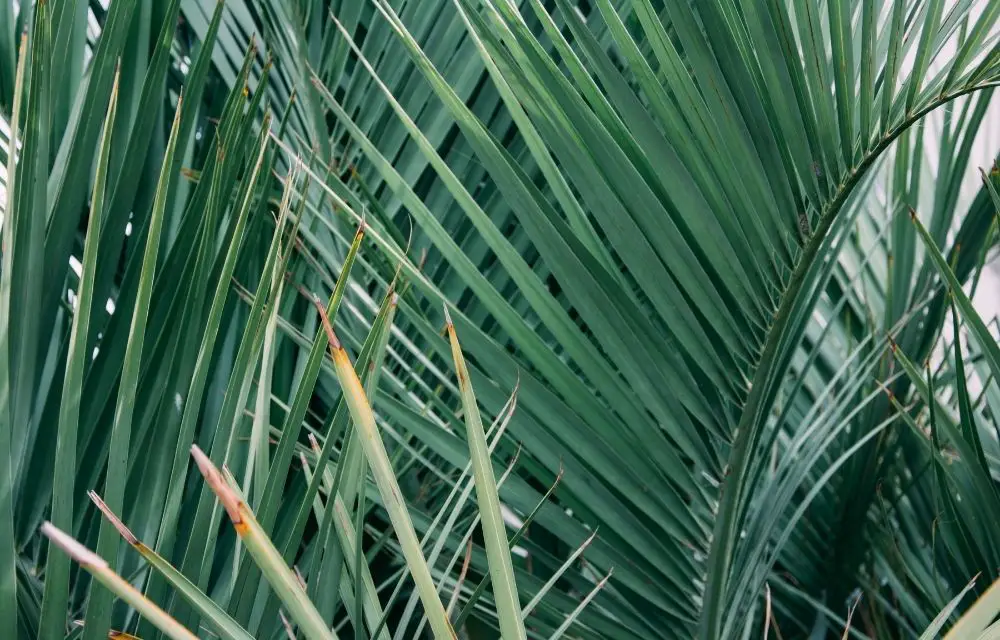
How to Fertilize Palm Trees?
The method of fertilizing palm trees is a technique that you can easily pick up once you understand the fundamentals of what your palm tree needs. When fertilizing palm trees, it’s important to use a slow-release fertilizer, such as Milorganite, which can work for up to 10 weeks, as it provides nutrients over a longer period of time and reduces the risk of leaching.
Quick-release fertilizer, especially in sandy soil, can easily wash away after only a few drops of rain. Milorganite also contains organic matter, which builds healthier soil and holds moisture.
Apply Milorganite four times annually, evenly scheduled throughout the growing season, which could begin as early as March and end as late as October, depending on your location.
Apply 5–10 lbs. of Milorganite by broadcasting it under the entire canopy of the palm. Stay two feet from the trunk of a palm; it’s tender and can be easily scared, or burned when applying quick-release fertilizers.
Palm Trees Frequently Asked Questions
Do palm plants need fertilizer?
To blossom and thrive in abundance most definitely!
All plants require fertilizer to grow stronger and healthy. If you provide your plant with the right fertilizer it will show you just how happy it is by how much it will be glowing and thriving.
What does Epsom salt do for palm trees?
Apply 2 to 4 pounds of Epsom salts per tree four times per year during the growing season to correct the symptoms of magnesium deficiency. Sprinkle the salts evenly over the root zone of the tree and water them into the soil.
What do you feed palms?
Before you decide on buying fertilizer for your Palm Tree, make sure you choose an NPK Fertilizer with a ratio of 3:1:3; N for Nitrogen, P for Phosphate, and K for Potassium. Preferably, get a slow-release fertilizer, which gradually releases nutrients, allowing the plant sufficient time to absorb all of them.
Are coffee grounds good for palm trees?
Coffee grounds are acidic, which is not suitable for palm trees. On the contrary, coffee grounds in appropriate amounts are good for palm trees.
Are eggshells good for palm trees?
If you are making your own palm fertilizer you can add eggshells to the mix. This is because eggshells can provide potassium and calcium which are essential for your palm tree to grow well.
Conclusion
In conclusion, palm fertilizer is an extremely important aspect to ensure your palm trees are thriving. Just like any plant fertilizers are their main source of nutrients and food.
Therefore, taking the time to really understand what your plant needs will help you have a stronger understanding when caring for your palm trees. Providing them with all their needs will have tremendous results in the long run.
This is because, when your palm trees are happy they tend to bloom and glow magically and this will create vibrant energy in your garden or house.
We hope that this article helped you understand your palm trees better and we wish you a wonderful journey ahead in growing lovely palms.
If you liked this be sure to check out:



